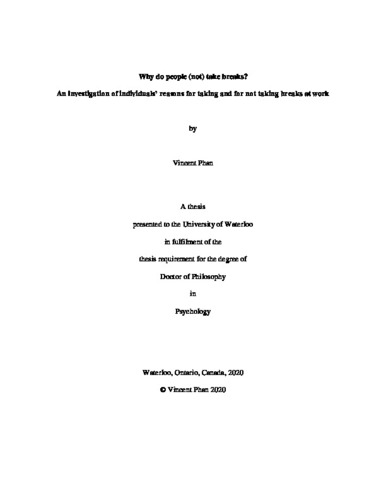| dc.description.abstract | Employees sometimes need breaks to deal with the demands of their jobs. Indeed, studies show that breaks allow employees to stay energized and maintain high levels of performance throughout the day. However, few studies have investigated employees’ reasons for taking a break. Further, almost no research has examined employees’ reasons for not taking a break, even though employees sometimes refrain from taking a break despite wanting or needing a break. I address this gap by identifying psychological processes underlying break-taking. In Study 1, I conducted a qualitative survey in which employees reported their reasons for taking and for not taking a break. This allowed me to identify break antecedents that may not have been considered previously, but that can nonetheless influence whether or not a person will take a break. In Study 2, I developed and validated measures of the antecedents found in Study 1 across two samples. In Study 3, I conducted a daily diary study to investigate the manner in which these antecedents combine with employees’ micro-break climate and conscientiousness to predict break frequency over five workdays. The results indicate that employees may want a break due to the negative experiences (fatigue, negative affect, and performance concerns) they encounter as a result of high workloads, but that characteristics of employees’ goals (expedience concerns) and of the broader work setting (micro-break climate) may deter employees from actually taking a break. Altogether, this dissertation challenges the implicit assumption within the literature that individuals’ break-taking behaviors are primarily driven by fatigue. | en |

